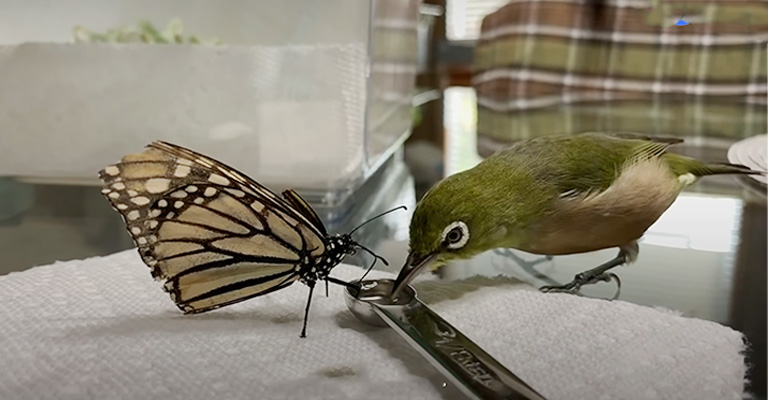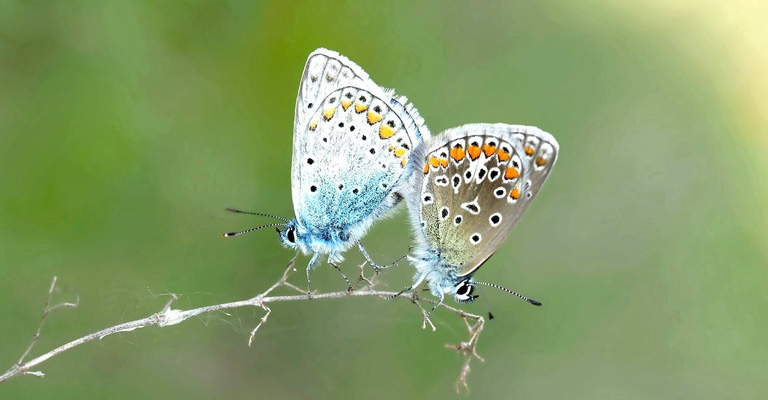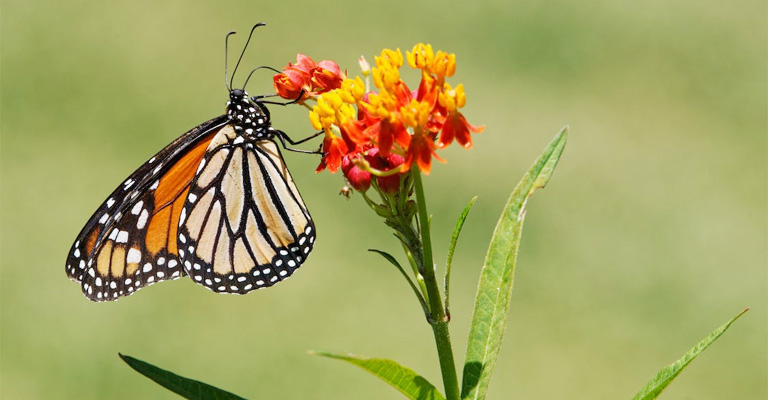The delicate dance between birds and butterflies in the natural world raises intriguing questions about the potential benefits and risks associated with this interaction.
While it’s not uncommon to observe birds feasting on a variety of insects, including butterflies, the dynamics of this relationship are far from straightforward. Butterflies, with their vibrant colors and intricate patterns, seem like tempting morsels for avian predators.
However, the story behind whether birds can or should consume butterflies is much more complex.
In this exploration, we delve into the intricacies of this avian-insect interaction, shedding light on the potential advantages and disadvantages for both birds and butterflies.
We’ll explore Can Birds Eat Butterflies- Potential Benefits & Risks. Additionally, we’ll examine how this interaction can impact ecosystems and biodiversity.

Can Birds Eat Butterflies- Potential Benefits
Here are some benefits and descriptions based on the web search results:
Protein
Birds get protein from eating butterflies, which helps them build and repair their muscles, feathers, and other tissues.
Protein is also essential for the growth and development of young birds, as well as for their immune system and metabolism.
Fat
Birds get fat from eating butterflies, which provide them with energy and calories. Fat also helps birds to maintain their body temperature, especially in cold weather.
Some fat-soluble vitamins and minerals are also present in butterfly fat, such as vitamin A, vitamin E, and iron.
Vitamins
Birds get vitamins from eating butterflies, which are important for their health and well-being. Vitamins help birds perform various functions in their body, such as vision, blood clotting, nerve transmission, and antioxidant defense.
Some of the vitamins that birds get from butterflies are vitamin B1, vitamin B2, vitamin B6, vitamin C, and vitamin K.
Minerals
Birds get minerals from eating butterflies, which are essential for their bones, teeth, muscles, nerves, and enzymes. Minerals also help birds to regulate their fluid balance, acid-base balance, and oxygen transport.
Some of the minerals that birds get from butterflies are calcium, phosphorus, magnesium, sodium, potassium, chloride, zinc, copper, manganese, selenium, and iodine.
Diversity

Birds get diversity from eating butterflies, which adds variety and interest to their diet. Diversity helps birds to avoid boredom and monotony in their feeding behavior.
It also helps them to adapt to different environments and seasons by exploiting different food sources.
Balance
Birds get the balance from eating butterflies, which complements their other food items such as seeds, fruits, berries, and nectar.
Balance helps birds to meet their nutritional needs and avoid deficiencies or excesses of certain nutrients. It also helps them to maintain their optimal weight and health status.
Control
Birds get control from eating butterflies, which reduces the population and impact of these insects on plants and crops.
Control helps birds to protect the natural balance and diversity of the ecosystem. It also helps them to prevent the spread of diseases and parasites that may be carried by butterflies or their larvae.
Fun
Birds get fun from eating butterflies, which stimulates their senses and instincts. Fun helps birds to enjoy their life and express their natural behavior.
It also helps them to relieve stress and boredom by providing them with a challenge and a reward.
Beauty
Birds get beauty from eating butterflies, which enhances their appearance and attractiveness. Beauty helps birds to display their colors and patterns to other birds or potential mates.
It also helps them to blend in with their surroundings or stand out from their predators by mimicking or contrasting with the butterfly’s wings.
Can Birds Eat Butterflies- Risks?

Birds can indeed eat butterflies, and this behavior is not uncommon in the wild. However, there are several risks associated with this practice, both for the birds and the butterflies.
Here are the risks, each with a brief description:
Toxicity
Some butterflies, particularly caterpillars, and chrysalises, contain toxic chemicals as a defense mechanism. Birds that consume toxic butterflies can experience illness or even death.
Waste of Energy
Butterflies have a low nutritional value compared to other prey, like insects or seeds. Pursuing butterflies can be energetically costly for birds, leading to wasted effort and reduced foraging efficiency.
Chasing Risk
The act of chasing butterflies can expose birds to predators or other dangers. It can divert their attention from more reliable food sources and increase their vulnerability to predation.
Reduced Reproductive Success
Focusing on catching butterflies may reduce the time and energy birds have for finding more substantial food items, potentially affecting their reproductive success and survival.
Impact on Butterfly Populations
Bird predation can influence local butterfly populations, especially if bird predation is significant in certain areas or during specific stages of a butterfly’s life cycle.
Learning Curve
Young and inexperienced birds may consume toxic butterflies without knowing the risks, leading to negative consequences for their health and survival.
Interrupted Pollination
Butterflies play a role in pollination, and excessive bird predation on butterflies can disrupt this essential ecological function.
Loss of Biodiversity
If bird populations increase due to a consistent source of prey like butterflies, this can lead to imbalances in local ecosystems and negatively impact other species.
Species Vulnerability
Certain butterfly species may be more vulnerable to bird predation due to their coloration, flight patterns, or habitat preferences. Predation can disproportionately affect these species.
While birds can eat butterflies, there are several risks associated with this behavior, including toxicity, energy waste, and potential negative impacts on both bird and butterfly populations.
Nature’s delicate balance relies on a variety of interactions, and understanding these risks helps us appreciate the complexity of ecosystems and the role each species plays in maintaining biodiversity.
Why Some Birds Don’t Eat Butterflies?

Many birds choose not to eat butterflies for various reasons despite the abundance of these insects in their environment.
Here are the reasons why some birds avoid consuming butterflies:
Toxicity
Some butterflies and their caterpillars are toxic, containing chemicals that can harm or even kill predators. Birds may learn to recognize and avoid these toxic species through trial and error or through observing other birds’ behavior.
Aposematism
Many toxic butterflies have bright and conspicuous colors as a warning to potential predators. Birds often associate these colors with danger and learn to avoid them.
Unpredictable Flight Patterns
Butterflies are known for their erratic and unpredictable flight patterns, making them challenging to catch compared to other, more predictable prey. Birds may find it inefficient to pursue them.
Low Nutritional Value
Butterflies are relatively small and provide minimal nutrition compared to other insects or prey. Birds may prioritize more energy-rich food sources.
Wings and Scales
Butterflies’ wings are covered in delicate scales, which might be unpalatable or difficult to digest for some birds, deterring them from consuming these insects.
Camouflage
Some butterflies have evolved to resemble inedible objects or their surroundings. Birds may not recognize them as prey due to their excellent camouflage.
Preference for Other Prey
Birds have diverse dietary preferences, and many species specialize in specific types of food, such as insects, seeds, or nectar. They may simply not be inclined to eat butterflies.
Avoiding Risk
Birds may avoid consuming butterflies to reduce the risk of injury. Pursuing agile and elusive butterflies could lead to collisions with obstacles or predators.
Seasonal Availability
Depending on the region and time of year, butterflies may not always be readily available as a food source, causing birds to focus on more abundant and reliable prey.
Birds have evolved various adaptations and preferences that lead them to avoid consuming butterflies in many cases.
These reasons encompass factors such as toxicity, flight patterns, nutritional value, and learned behaviors that help birds make efficient dietary choices in their natural environments.
FAQ
While some birds can safely consume butterflies, not all species can. Certain butterflies are toxic, which can harm or even kill birds. Birds often learn to recognize and avoid toxic species through trial and error.
Birds may avoid butterflies due to their toxicity, unpredictable flight patterns, low nutritional value, or a preference for other prey items that offer more energy.
Yes, for some bird species, consuming butterflies can provide a seasonal or supplementary food source, contributing to their overall diet and nutritional intake.
Many butterflies employ defense mechanisms such as toxicity, aposematism (warning colors), camouflage, and erratic flight patterns to deter birds and other predators.
Bird predation on butterflies can have cascading effects on ecosystems. It can influence butterfly populations, affect plant pollination, and impact other species dependent on these insects, highlighting the interconnectedness of biodiversity in nature.
Conclusion
The relationship between birds and butterflies, characterized by potential benefits and risks, highlights the multifaceted nature of predator-prey interactions in the natural world.
While some bird species have evolved to consume butterflies, others have developed strategies to avoid them due to the risks associated with toxicity and erratic flight patterns.
For birds that do consume butterflies, these insects can serve as a seasonal or occasional dietary supplement rather than a primary food source.
The presence of butterflies in bird diets also underscores the complexity of ecosystems, where each species plays a unique role.
Bird predation on butterflies can have cascading effects, affecting not only butterfly populations but also other organisms dependent on these insects for pollination or as a food source.